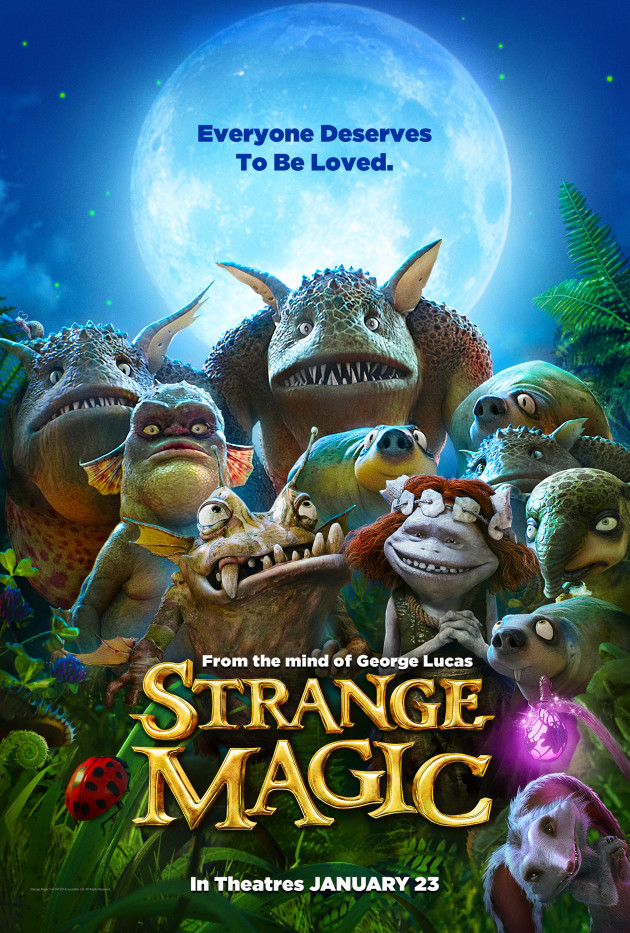Sometimes it helps to summarize a movie to its essentials, in order to help you conceptualize what it's about. The Lord of the Rings, for example: “A struggle to overcome a dark lord, with a storyline that unfolds on multiple fronts, as the dark lord is resisted in various ways.” The Princess Bride is about: “one man searching to reunite with his lost love, and one man searching for revenge.”
Other than “Strange Magic is a story about finding and avoiding love,” which doesn't even begin to cover the movie, I can't think of a pithy way to summarize it. Now sometimes it's bad when you can't reduce a movie that way, because it can show a lack of focus. Sometimes that's good that you can't reduce a movie that way, because it shows richness and complexity.
So what about Strange Magic? What's it mean here? All I can tell you, ultimately, is that Strange Magic worked, and I can't imagine it working as well if it were any easier, or any more difficult, to summarize.
Strange Magic is an animated work of fairy tale fantasy, told through a combination of spoken dialogue and slightly modified versions of rock and pop songs from the 1960s and 1970s. If I were to try and describe the plot, solely as a courtesy to the reader, I guess I'd tell you it begins with a naïve fairy princess cheated on by a handsome but selfish fairy prince on the eve of their wedding. As a result, that princess rapidly turns from a traditional fairy tale princess to an ass-kicking fantasy heroine. Through a series of near-indescribable events, she finds love, loses it, finds it again, wins the respect of her father (a fairy king who is so fat his customized armor struggles to accommodate him), and alternately performs incompetently in and super-competently in a series of fight and action scenes.
The action of this movie involves a sugar plum fairy, a love potion, a particularly impish imp, toadstool sentries who communicate through what amounts to a game of “telephone” with results that are both predictable and amusing, and two toadies of the villain whose utterly predictable, nearly trite running gags surprisingly don't get old. ->

-> This film is bombastic without being overly loud, unapologetically sappy (and the better for it), original and cliched at the same time, and has a lot of laughs. Since it's a comedy, the latter may well be the best thing to say about it: It was a comedy, and it had genuine laughs not of the MST3K variety. (I note the contrast with the much-lauded animated film Shrek, which I appreciated, but didn't laugh at. It was a comedy, and I was not laughing.) ->
by Galen Knighthawke
2007-2015 Four Tokens Media
-> The climactic scene alone, to give you an idea of the scope and ground this film attempts to cover, involves four characters, two swords, one staff, multiple quick trade-offs of the heroic and villainous roles played by all of those four characters alternately, a mass escape from an underground prison, and a dark palace of thorns (with a gigantic predators' mouth for a gateway) collapsing in on itself. I couldn't tell you now what happened but, when it did, I followed it and laughed (in a good way) the entire time.
The comedy in this film is multi-layered. There's witty humor, there's gross out child humor (including one joke that in retrospect you realize is homophobic, but don't recognize as such at the time – an excellent testimony to how well this film does its job), there's a joke you won't guess unless you listened to the radio during the 1970s, there's a sight gag you won't get unless you've seen the heavy metal singer David Coverdale sing live, and there's jokes concerning what should be a trope I no longer care about – the film's nominal villain has an amusingly over-bearing mother who's always trying to fix him up with women.
Mostly, though, there's humor you get because it works in context. It doesn't matter how funny something'd be seen out of context. It works here, when it happens. Ultimately that's all that matters.
The singing is competent, even, on occasion, quite good. The music works, it advances the story and fills in the gaps between events. Both of those are important in a musical for reasons which I should hope are obvious.
I realize that I haven't told you much about the plot, and that's telling. The movie works well enough in context that you don't think about the plot, don't absorb it, you just are carried along. You smile, you laugh, you cry, and you cringe, all in the appropriate places.
Ultimately, the film just works. I can't quite explain how or why, it just does. The year in fantasy movies just got off to a surprisingly strong start.